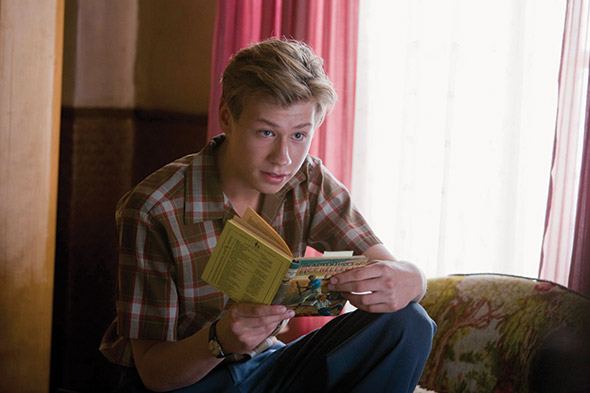
Text by Heidi Atwal
His youthful exterior consists of a rakish grin and kempt blonde locks, but in The Reader, German newcomer David Kross displays degrees of dramatic lyricism to rival that of a seasoned actor twice his 18 years. Kross plays opposite Kate Winslet in the film adaptation of Bernhard Schlink’s best-selling novel. The narrative follows Michael (Kross), a sprightly teen who enters into an affair with an older paramour named Hannah (Winslet), to whom he finds himself reading literary classics—from Lady Chatterley’s Lover to David Copperfield. It is a love story, to be sure, but one eventually polluted by Hannah’s nefarious role in Holocaust-era atrocities. In German, the term vergangenheitsbewältigung, or, “the struggle to come to terms with the past,” has been used to describe post-war guilt. The weight of this moral strife afflicts the lovers and lives with Michael in his older years, when the character is played by Ralph Fiennes.
Director Stephen Daldry (The Hours) handpicked Kross among a host of German youths to portray young Michael, a role that demanded unbridled emotional investment. Under Daldry’s wing, Kross learned English and prepared for a major crossover into mainstream cinema. The duo discusses The Reader‘s many shades of complexity, a calculated approach to love scenes and working with Academy darling Winslet.
When did you first come across The Reader, the novel?
david kross: In preparation for the movie, actually. I hadn’t heard about it, but when I told my parents, “I’m auditioning for The Reader,” my father was so excited because he knew and loved the book. Also, it’s a school book [in Germany].
Stephen Daldry: A friend gave it to me, and I read it in one sitting. I rang up to find out who had the rights, and my friend Anthony Minghella had them, so I badgered Anthony, because he had always wanted to make it himself. In the end Anthony relented, I think because he had so many projects he couldn’t see himself getting around to it for a few years.
David, you’re relatively new to film and you’re quite young. How did Stephen walk you through this project?
DK: For me it was nerve wracking because I couldn’t speak any English. I had to sit down with a dialect coach and learn English, actually, and go through the script and learn to speak with an understandable accent. The great thing about Stephen is he treats every actor the same. He doesn’t see any difference between children actors and adult actors. He’s a great director for actors because he really works with them, listens to them, and talks to them.
Did you have any concerns about portraying the sexual relationship between Hannah and Michael?
DK: I was very nervous because this was the first time I had to do these kinds of scenes. Stephen really knew what he wanted; he was very clear about everything. He told me I should worry about the more important acting scenes, which was right, because there are some scenes in the film that were much more difficult.
SD: It’s mathematics. But Kate’s been through this before, and she’s very supportive and very generous. It’s not a time for improvisation. You work to a plan to avoid embarrassment for David; so he can be free within a very tight, defined, series of actions.
Did David and Ralph work together to establish a sense of continuity between the younger and older Michael?
DK: We never worked on the set together, but we had some time together in preparation for the movie. We had to watch each other, but it was never like I was trying to copy him or he was trying to copy me.
SD: I don’t think David ever felt he was imitating Ralph or Ralph felt he was imitating David. They do echo each other. There is something profoundly soulful about Ralph. The rivers with Ralph always run deep. I think the same is true of David.
David, as a newcomer to English cinema, how do you hope to be received in America as a young actor?
DK: I hope audiences like the movie [laughs]. I love the English language and I love to act in the English language, because it’s so different from acting in German.
Since literature plays such an integral role in the film, can you discuss what you think the role of literature is for Hannah and Michael?
DK: I think for Michael, reading is really about him doing Hannah a favor, entertaining her. I really enjoyed that Hannah goes so deeply into these stories, the fact that I make her laugh and make her cry.
SD: For Hannah, literature allows her access to worlds and ideas that she would not have access to otherwise. How much consciousness she gets from her reading is a subject that I hope will be under a huge amount of debate. How much literature moves her moral mind is unknown, but I certainly didn’t want to make it clear.

